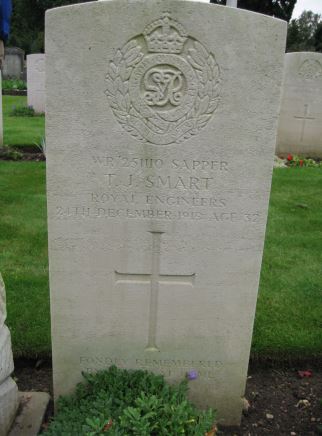296th Railway Company, Royal Engineers

Thomas Joseph Smart was born around May 1887, in the parish of St. Luke’s, Gloucester. He was the son of Alfred Smart (a labourer) and his wife Jane who (at the time of the 1891 Census) lived at 1 St James’ Street in the Barton district of Gloucester. At that point in time the couple had seven children, of whom Thomas was the youngest. It appears likely that both his parents were dead by the time the next census was taken in 1901, as Thomas and siblings appear to be living with his eldest brother and wife.
The 1911 Census shows Thomas still living with his eldest brother, James Henry George Smart and his wife Emma Jane, at 94 Melbourne Street, Gloucester. Thomas was now employed, as a wooden step maker with the Hatherley Step Works.
Prior to the Great War Thomas had been a volunteer member of the Gloucestershire Royal Engineers and when it disbanded, he became a Class 2 member of the National Reserve. This fact was noted on his enlistment papers when he joined the Army, for the duration of the war, on 18 January 1915. Unsurprisingly he requested to serve with the Royal Engineers (RE) and was allocated the number 55817. He gave his elder brother’s name as next of kin.
Unusually an Army Service Record has survived for Thomas and this details his initial posting to the RE Depot and thereafter to 113 Company (raised in Cheltenham) on 24 January 1915. At a later date (unclear when) he transferred to 296 Railway Operating Company, RE and his number changed to WR/251110. The principal role of Railway Companies was the construction and maintenance of standard gauge rail track, to enable supplies to be taken as near to the Front as possible.
Thomas served in the UK from 18 January 1915 until 13 April of that year, when 113 Company joined the British Expeditionary Force on the Western Front. He remained abroad (except for leave) until 2 March 1919, when he returned to the UK and was de-mobilised on 2 April 1919. His service record carried a ‘very good’ character endorsement. He was then returned to civilian life but had been placed in the ‘Z’ Reserve, liable for immediate recall, should the peace treaty negotiation with Germany break down and hostilities recommence. His service, up to the time of death, was four years and 341 days.
Following demobilisation, unmarried, he returned to live with his brother and wife, this time at 5 Carmarthen Street, Tredworth, Gloucester but (according to the report of his funeral in the Gloucester Journal of 3 January 1920) he was not a well man. He was diagnosed with vascular disease of the heart and this was considered by the authorities to have been aggravated by his military service and he was granted a 50% disability pension, reviewable periodically.
Thomas Joseph Smart died at home (5 Carmarthen Street), presumably of heart disease, on 24 December 1919, aged 32. He had returned to employment at Hatherley Step Works and his fellow workmates joined with family members and discharged soldiers for his semi-military funeral on 29 December. The local newspaper listed a Miss Ball (fiancée) as one of the mourners. The funeral was at Gloucester Old cemetery and his remains were buried there, a standard CWGC headstone now marks the grave. He is commemorated on the Gloucester War Memorial.
Researched by Graham Adams 17 January 2020
